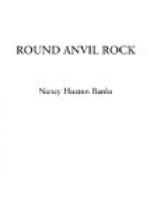There across the northern sky sped the great comet. Come, none ever knew whence, and speeding none ever knew whither, it reached on that night—on this fifteenth of October—the summit of its swift, awful, arching flight. It was now at the greatest of its terrible splendor and appalling beauty. It was now at the very height of its boundless influence over the hopes and fears of the superstitious, romantic, emotional, poetic race which was struggling to people the wilderness. As it thus burst upon the vision of the three horsemen, each felt its power in his own way,—the man of faith, the man of science, and the fanciful boy,—each was differently but deeply moved. The men looked at the comet as the wise and learned of the earth look at the marvels of another world. The boy gazed quiveringly, like a harp struck by a powerful hand. He strove to cast his fancies aside, and to remember what he had heard before the comet had become visible to this country. He tried vainly to recall the talk about it—not the idle and foolish superstitions which Miss Penelope had mentioned, and which all the common people believed—but the scientific facts so far as they were known. Yet even his imagination failed to realize that this flaming head, with its strange halo of darkness, and its horrible hair of livid green light, was four million times greater than the earth; or that its luminous veil—woven of star-dust so fine that other stars shone through—streamed across one hundred million of miles, thick strewn with other stars.
“Listen!” cried the doctor. “Hear that!” A distant roaring, like the oncoming of a sudden storm, rolled upward from the mists and darkness lying thicker around the swamp.
“There it is again!” Doctor Colbert went on, as if he had been waiting and listening for the sound. “There must be great excitement at the camp-meeting on this last night. Does it still interest you, Father? It does me, intensely. This is not the usual peculiar excitement which seems to belong to a crowd, though that, too, is always curious, mysterious, and interesting. We all know well enough that for some unknown reason a crowd will do wild, strange, and foolish things, which the individuals composing it would never be guilty of alone. But this is something entirely different and still more curious and mysterious. Those people down yonder keep this up by themselves when they are alone—it attacks some of them before they have ever seen one of the meetings. It is certainly the strangest phenomenon of its kind that the world ever saw. It never loses its painful fascination for me. I can’t pass it by. How is it with you?”
The priest hesitated before replying. “Any form of faith—the crudest, the most absurd that any soul ever staked its salvation upon—must always be the most interesting subject in the world to every thinking mind.”




